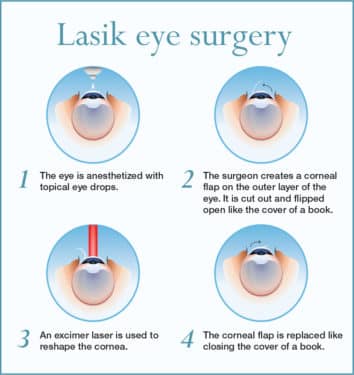Being Reluctant On SMILE Surgical Treatment? Delve Into Crucial Factors To Consider And Understandings To Assist You Make An Enlightened Decision Concerning Your Visual Future
Being Reluctant On SMILE Surgical Treatment? Delve Into Crucial Factors To Consider And Understandings To Assist You Make An Enlightened Decision Concerning Your Visual Future
Blog Article
Web Content By-Diaz Cochran
If you're pondering SMILE eye surgery, consider this: are you prepared to embrace prospective aesthetic freedom, or does the idea of any kind of threats make you be reluctant? Your decision will depend upon a careful balance of considering the advantages versus the unpredictabilities. It's essential to dive deeper right into the subtleties of SMILE surgical procedure to make an educated choice that straightens with your visual objectives.
Recognizing SMILE Eye Surgical Procedure
When thinking about SMILE Eye Surgical procedure, it is essential to comprehend the procedure and its benefits. SMILE, which stands for Tiny Cut Lenticule Removal, is a minimally invasive laser eye surgical treatment that corrects typical vision troubles like nearsightedness (nearsightedness).
During the procedure, your eye cosmetic surgeon will make use of a femtosecond laser to develop a small cut in your cornea. With this cut, a little disc of cells called a lenticule is removed, improving the cornea and correcting your vision.
Among the vital benefits of SMILE Eye Surgical procedure is its quick recovery time. Numerous people experience enhanced vision within a day or more after the procedure, with minimal pain.
Furthermore, SMILE is known for its high success rate in offering long-lasting vision adjustment. Unlike LASIK, SMILE doesn't need the production of a flap in the cornea, reducing the threat of problems and allowing for a more stable corneal structure post-surgery.
Recognizing the procedure and its advantages is critical when thinking about SMILE Eye Surgical treatment for vision improvement.
Advantages and disadvantages of SMILE
Considering SMILE Eye Surgical procedure for vision adjustment comes with numerous advantages and possible drawbacks.
Among the main pros of SMILE is its minimally intrusive nature, as it involves a small incision and commonly causes fast recovery times. The procedure is also known for creating very little pain and dry eye signs post-surgery contrasted to various other vision modification approaches. Additionally, SMILE has been shown to give exceptional visual outcomes, with lots of clients attaining 20/20 vision or much better.
On http://donny041brook.booklikes.com/post/6564594/is-advanced-lasik-eye-surgery-right-for-you-figure-out-here , a prospective con of SMILE is that it might not be suitable for people with severe refractive mistakes, as the therapy array is rather minimal compared to LASIK. Another consideration is that the learning contour for specialists implementing SMILE can impact the availability of knowledgeable service providers in particular locations.
It is necessary to evaluate these advantages and disadvantages carefully when making a decision if SMILE is the ideal option for your vision improvement requirements.
Determining Eligibility for SMILE
To establish if you're qualified for SMILE eye surgical treatment, your optometrist will certainly perform a complete assessment of your eye health and wellness and vision requirements. During this analysis, aspects such as the stability of your vision prescription, the thickness of your cornea, and the total health of your eyes will certainly be evaluated.
Typically, simply click the following website page for SMILE are over 22 years old, have a secure vision prescription for at least a year, and have healthy and balanced corneas without problems like keratoconus.
Your optometrist will likewise consider your overall eye health and wellness, any type of existing eye conditions, and your lifestyle needs to determine if SMILE is the right option for you. Cataract Surgery Astigmatism to interact any type of specific aesthetic requirements or worries you may have during this examination to make sure that the treatment lines up with your assumptions.
If you aren't qualified for SMILE, your eye doctor may suggest alternate vision adjustment choices that far better suit your specific demands and eye health status.
Final thought
Inevitably, making a decision whether SMILE eye surgical treatment is right for you requires mindful consideration of your individual eye health and aesthetic needs. Seek advice from your ophthalmologist to determine your eligibility for the treatment and weigh the possible advantages and downsides. Bear in mind to connect any kind of concerns or concerns you may have throughout the assessment process to make an informed decision about your vision correction alternatives.
